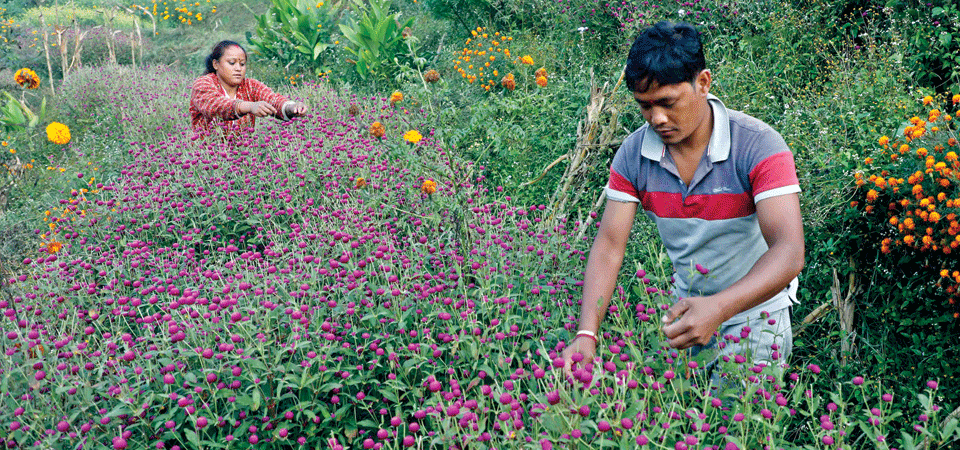Gundu farmers busy picking flowers and threading garlands for Tihar

By A Staff Reporter
Kathmandu, Oct. 27: As Tihar, the second biggest festival of Nepali people, is around the corner, the farmers of Gundu in Suryabinayak Municipality-7 in Bhaktapur are now busy picking and threading garlands of Makhamali flower for Bhai Tika, the main day of the festival.
Tihar is the festival of lights and flowers, so Makhamali garlands are culturally very important for the fifth or the last day of the festival known as Bhai Tika.
Makhamali flowers remain in high demand especially for Bhai Tika. Makhamali and Marigold flowers worth millions of rupees are produced in Suryabinayak Municipality.
Flower traders have already started visiting the farmers in their houses to collect Makhamali flowers for Tihar. Normally, the farmers sell a flower garland for Rs. 22 to 25 at wholesale price from their houses, but during festival the rate rises manifold in the market.
The demand for Makhamali flowers is also high abroad. Nepali people staying or living in several countries abroad demand Makhamali garlands for Tihar, said Anita Basnet, a flower trader and farmer of Gundu in Ward No. 7 of the municipality.
“I have been delivering Makhamali flowers to Nepali expatriates in foreign countries like America, UAE, Korea, Australia and Japan through individual contact for a few years now. I have delivered 10,000 pieces of Makhamali garlands to Nepalis in America and another 5,000 pieces are in process of being delivered, she said.
Basnet further said the ordered garlands are usually collected from other farmers at the current market price.
“I am both a flower farmer and a trader, so I deliver garlands of Makhamali flower. I have cultivated flowers in two-and-a-half ropanis of land,” she added.
Starting with the month of Shrawan (August), the locals start picking the flowers. They pick up at least 10 times in one season.
The picked flowers are kept in low light areas of the house after making garlands. Because floriculture business is more lucrative than paddy cultivation, Gundu farmers have been increasingly attracted towards both Makhamali and Marigold cultivation, Puja Basnet of Gundu said.
She has been in floriculture business for the last 10 years and has been cultivating Makhamali flowers in around six annas of land, earning around Rs. 20,000 in one season.
“We are now busy dealing with flower traders and picking flowers and threading the garlands as per the demand of the traders,” she said.
Another floriculture farmer Rupa Basnet, who is a graduate in agriculture, has been commercially growing Makhamali and Marigold flowers for the last four years.
She has been cultivating the flowers in seven ropanis of leased land. Making 12 tunnels, she has planted Marigold flower for off-season. That’s because demand for Marigold is high in all seasons. Besides, she has planted Makhamali, a seasonal flower, whose demand soars during Tihar.
Unstable market price and demand for Marigold create problem to the farmers who grow flowers in a large area.
“The market price determines our annual income. We earn Rs. 500,000 to Rs. 700,000 if the flowers are sold at a good price. Sometimes, we incur losses when both the demand and price of the flowers drop,” she said.
Gundu is known for commercial floriculture. Flowers are grown in around 50 hectares of its land.
The municipality has provided Rs. 394,000 grant for each farmer involved in floriculture through the Sana Kishan Agriculture Co-operative Ltd. to motivate them towards the business.
Ambika Bhandari, president of the Co-operative, said that over 200 such farmers had been benefitting from the grant.
“We have produced 45,000 Marigold flower plants and distributed them among the farmers at the rate of Rs. 1 per plant. The grant provided for floriculture has encouraged other farmers to stay in or switch to floriculture business,” she said.
Around 100 hectares of land is used to grow flowers in Bhaktapur, according to the municipality.
Recent News

Do not make expressions casting dout on election: EC
14 Apr, 2022
CM Bhatta says may New Year 2079 BS inspire positive thinking
14 Apr, 2022
Three new cases, 44 recoveries in 24 hours
14 Apr, 2022
689 climbers of 84 teams so far acquire permits for climbing various peaks this spring season
14 Apr, 2022
How the rising cost of living crisis is impacting Nepal
14 Apr, 2022
US military confirms an interstellar meteor collided with Earth
14 Apr, 2022
Valneva Covid vaccine approved for use in UK
14 Apr, 2022
Chair Prachanda highlights need of unity among Maoist, Communist forces
14 Apr, 2022
Ranbir Kapoor and Alia Bhatt: Bollywood toasts star couple on wedding
14 Apr, 2022
President Bhandari confers decorations (Photo Feature)
14 Apr, 2022











